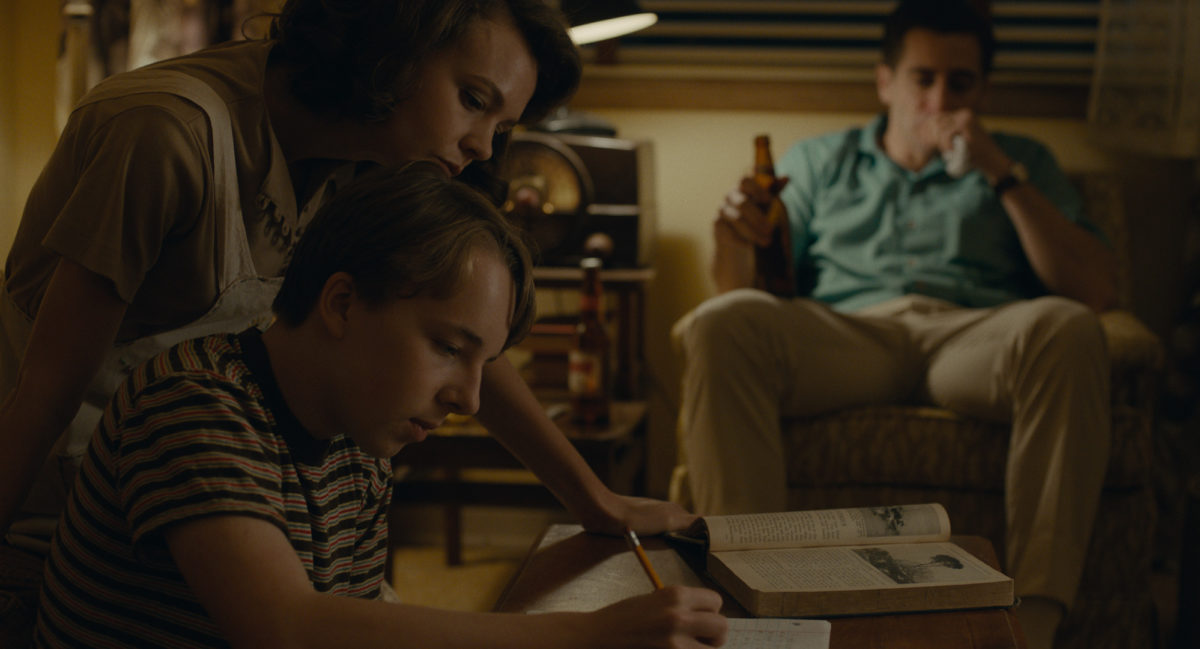Wildlife (Paul Dano, 2018) is a deceptively simple American family drama about the Brinsons, a family of three living in picturesque 1960s Montana, an agricultural state that is home to mountain ranges and prairies. It is also home to a wildfire problem, which holds a small yet essential point in the plot. Like the forest fires, the film takes its time to show the undoing of the family.
Tensions rise when the Brinson breadwinner Jerry (Jake Gyllenhaal) is fired from his job cleaning shoes at a golf course. He signs up to become, of all things, a wildfire fighter. Housewife Jean (Carey Mulligan) staunchly disapproves as the job takes him far from home and into certain danger. Fourteen-year-old Joe (Ed Oxenbould) takes a front seat to all this drama and can only watch as his mother falls into an affair with Warren Miller (Bill Camp), a pudgy, middle-aged businessman.
At first, Jean fits the portrait of a doting housewife and mother, but this act quickly crumbles after Jerry leaves for warmer pastures. That said, the character could be a contender for one of the worst moms in recent film history. She lies, cheats, and maybe worst of all, treats her son like a peer, for lack of a confidante.
Jean sees in Warren a stability that she never found in her husband. Her life has been riddled with anxieties and traumas. In a scene at a diner, Jean reveals that she wishes she wasn’t called Jeanette because it sounds like a waitress’ name. She is open with her class aspirations at a pivotal dinner scene at Warren’s upper middle-class home when hints that she’d has loftier aspirations for her son, perhaps an Ivy League education. These material trappings that Warren possesses spell success to her and she, for the moment, clings for dear life. That Warren also gives her a breather from her marital discontent is a mere cherry on top.
Scattered about the film are images of all-American nostalgia — football games, diners, a fuzzy television with knobs, sofa sets with gaudy patterns — which ground the film firmly into its temporal space. A slowly moving camera captures the events from a distance, sometimes only giving a glimpse of the characters, situating us into Joe’s vantage point as he overhears and eavesdrops on scenes and conversations. The drama is interspersed with majestic views of Montana landscapes that give a brief, welcome break from the tightly coiled conflict. The exteriors provide a rich contrast to the tumultuous inner lives led by the Brinsons.
But the beauty of the terrain pales in comparison to the strong performances at the fore of the film that shine through despite the occasionally clunky dialogue (Kazan and Dano’s screenplay is nuanced enough but there are some things that are better left on the chopping board).
Most notable is Mulligan’s unexpected turn as Jean, which is a departure from her repertoire of coy, well-meaning characters. Mulligan makes Jean’s desperation seem understandable, even sympathetic. There is a troubling backstory only hinted at in certain lines but that simmers underneath every twitch and inflection of Mulligan’s complex character study of a troubled housewife.
In the end, the threads culminate into a cliché picture taking session at the studio where Joe works. It is supposed to be a loaded moment but in the flurry of the events that came before, we don’t fully feel its gravitas. Though the film is patient in its unfolding, it rushes through its final scene, a culmination of all the threads in the film that is tied up almost too neatly. In stories of dysfunction, we know that this isn’t always the case.
